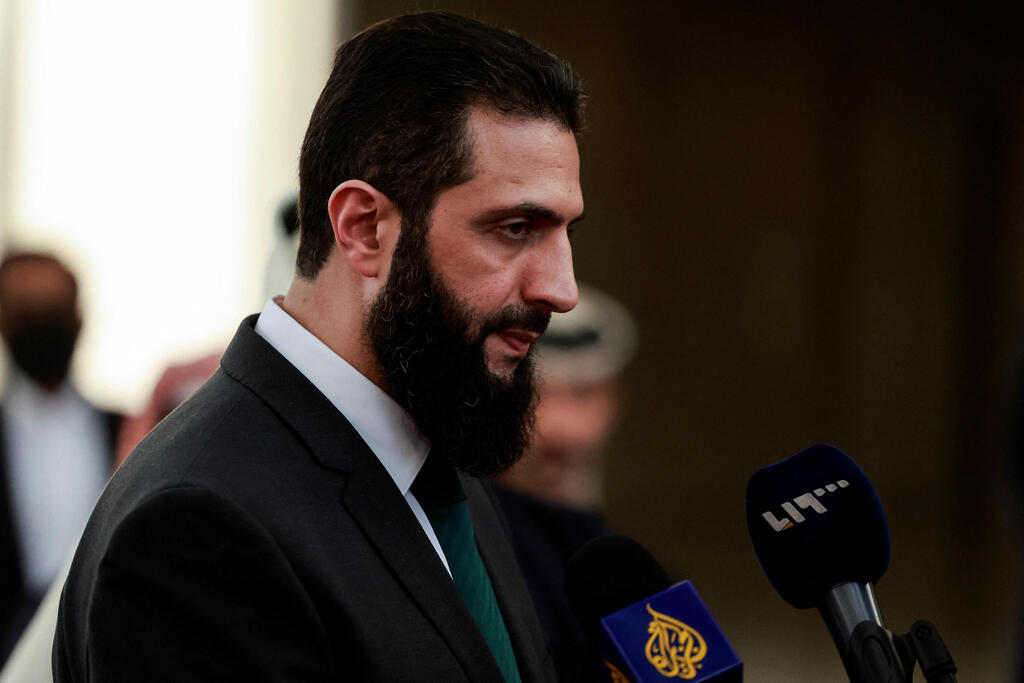Getting your Trinity Audio player ready...
Barbara Leaf, the U.S. Assistant Secretary of State for Near Eastern Affairs, left her meeting with Ahmad Al-Sharaa, Syria's de facto leader, highly satisfied.
The press conference scheduled for the conclusion of the event was canceled under the pretext of security concerns. However, after 12 years of American diplomatic disengagement, Leaf gave a positive report about the conversation, which lasted many hours.
Leaf, by the way, was accompanied by senior advisors, including Daniel Rubinstein, a Jewish former U.S. consul in Jerusalem, who now serves as a special advisor on Syrian affairs.
Abu Mohammed al-Golani, who traded his nom de guerre for his official name Ahmad al-Sharaa after Bashar Assad fled Syria, has also changed his appearance. No longer clad in the light robes of his Al-Qaeda days or Zelensky-style military fatigues, he arrived at the meeting with Leaf in a civilian suit, without the traditional head covering (amama).
Leaf, for her part, did not hide her satisfaction and announced the cancellation of the $10 million financial reward for anyone providing information on al-Sharaa's, who had been listed among the most wanted terrorists since 2017. Undoubtedly, a significant achievement for al-Sharaa.
In Umayyad Square in Damascus, crowds continue to dance and wave banners declaring a "New Syria," while in Aleppo, tens of thousands have poured into the streets to celebrate. Film actor Maxim Khalil, who returned to Syria after 13 years in exile due to fear of arrest, embraced his fans and pleaded, "Let the new regime organize itself to act for the benefit of us all. Syria is now turning a new page."
Get the Ynetnews app on your smartphone: Google Play: https://bit.ly/4eJ37pE | Apple App Store: https://bit.ly/3ZL7iNv
In Israel, officials are treading carefully around the emerging Syrian regime. On one hand, military operations continue, but with a focus on specific targets — Iranian weapons depots and Hezbollah military camps.
On one hand, al-Sharaa has pledged that women will be able to study—'even medicine'—and work. On the other hand, when photographed with a young female passerby in Damascus or interviewed by a CNN reporter, he insists that they wear a headscarf
Ahmad al-Sharaa, in his first public statement regarding Israel, criticized the IDF's operations in Syrian territory. Yet, in the same breath, he clarified that his Syria intends to honor the 1974 disengagement agreements following the Yom Kippur War. He immediately called on the international community to ensure Israel adheres to these agreements. In an interview with The Times of London, he said, "We do not want conflicts with any country, not even with Israel."
Attention should also be paid to al-Sharaa's ambivalence regarding women in Syria. On one hand, he speaks about women who were thrown into prisons and subjected to assault. He has pledged that women will be able to study—"even medicine"—and work. On the other hand, when photographed with a young female passerby in Damascus or interviewed by a CNN reporter, he insists that they wear a headscarf.
Arab media outlets outside Syria have been quick to launch sharp criticisms, warning that "Golani-Sharaa intends to establish an Islamic state akin to Afghanistan."
In Israel, intelligence agencies closely monitor events in Syria and attempt to decode whether there is truly a "new" al-Sharaa or merely a rebranded version of his former self. His demand for women to wear head coverings has not gone unnoticed. Has he genuinely reinvented himself? The pieces of the puzzle have yet to fully align.
The IDF continues its operations in Syria, and all eyes remain on Turkish President Recep Tayyip Erdogan, who ultimately holds significant influence over the unfolding events.
First published: 12:36, 12.30.24



